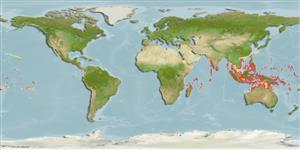Environment: milieu / climate zone / depth range / distribution range
Ökologie
seewasser riff-verbunden; tiefenbereich 1 - 40 m (Ref. 9710). Tropical; 32°N - 18°S
Indo-Pacific: Mauritius, Reunion, Maldives and Sri Lanka (Ref. 33390) to the Society Islands, north to southern Japan, south to Scott Reef.
Size / Gewicht / Alter
Maturity: Lm ? range ? - ? cm
Max length : 13.0 cm TL Männchen/unbestimmt; (Ref. 48635)
Rückenflossenstacheln (insgesamt) : 13; Rückenflossenweichstrahlen (insgesamt) : 9; Afterflossenstacheln: 3; Afterflossenweichstrahlen: 5. Eye-like spots in the soft dorsal fin and feeler-like tentacles in front of the mouth (Ref. 48635). Mid-dorsal spines shorter than body depth. The only species of Dendrochirus with a pair of distinct ocelli on the soft-rayed dorsal fin (Ref. 37816).
An uncommon inhabitant of clear waters rich in corals to depths of 40 m or more. Feeds on small fishes and crustaceans (Ref. 89972). Secretive and usually observed at night. During the day in caves and sponges, and usually well out of sight (Ref. 48635). Venomous spines.
Life cycle and mating behavior
Maturities | Fortpflanzung | Spawnings | Egg(s) | Fecundities | Larven
Myers, R.F., 1991. Micronesian reef fishes. Second Ed. Coral Graphics, Barrigada, Guam. 298 p. (Ref. 1602)
IUCN Rote Liste Status (Ref. 130435)
Nutzung durch Menschen
Fischereien: kommerziell; Aquarium: Kommerziell
Tools
Zusatzinformationen
Download XML
Internet Quellen
Estimates based on models
Preferred temperature (Ref.
123201): 26.6 - 28.9, mean 28 °C (based on 432 cells).
Phylogenetic diversity index (Ref.
82804): PD
50 = 0.5078 [Uniqueness, from 0.5 = low to 2.0 = high].
Bayesian length-weight: a=0.01023 (0.00444 - 0.02358), b=3.01 (2.82 - 3.20), in cm total length, based on LWR estimates for this (Sub)family-body shape (Ref.
93245).
Trophic level (Ref.
69278): 3.7 ±0.6 se; based on size and trophs of closest relatives
Widerstandsfähigkeit (Ref.
120179): hoch, Verdopplung der Population dauert weniger als 15 Monate. (Preliminary K or Fecundity.).
Fishing Vulnerability (Ref.
59153): Low vulnerability (10 of 100).
Nutrients (Ref.
124155): Calcium = 93.3 [46.5, 212.9] mg/100g; Iron = 0.722 [0.373, 1.860] mg/100g; Protein = 18.1 [16.2, 20.1] %; Omega3 = 0.234 [0.102, 0.631] g/100g; Selenium = 24.2 [12.4, 58.9] μg/100g; VitaminA = 168 [57, 462] μg/100g; Zinc = 1.62 [1.11, 2.34] mg/100g (wet weight);
